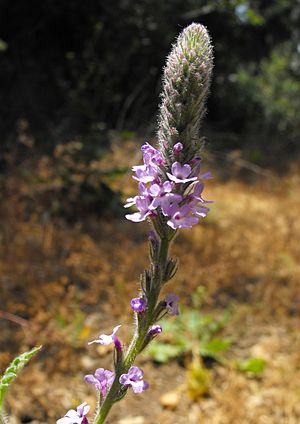Western vervain facts for kids
Quick facts for kids Western vervain |
|
|---|---|
 |
|
| Scientific classification | |
| Genus: |
Verbena
|
| Species: |
lasiostachys
|
Verbena lasiostachys is a type of plant often called the western vervain. It's part of the verbena family.
This plant grows naturally in western North America. You can find it from Oregon all the way through California and down to Baja California in Mexico. It's quite common and grows in many different places. These include areas like the California chaparral and woodlands and the Sierra Nevada mountains. It can also grow easily in places where the ground has been disturbed, sometimes appearing like a common plant that grows where it's not planted.
What the Western Vervain Looks Like
The western vervain is a perennial herb. This means it's a plant that lives for more than two years and often comes back each year. It has one or more stems that can be hairy and grow either close to the ground or stand upright, reaching up to 80 centimeters (about 31 inches) long.
Leaves and Flowers
The leaves of the western vervain are also hairy. They have edges that are toothed or lobed, meaning they have small cuts or rounded sections. The leaves have short, winged stems called petioles that connect them to the main stem.
The flowers grow in a cluster called an inflorescence. This plant usually has one to three spikes of flowers. The flowers are packed closely together at the top of the spike but are more spread out lower down. Each tiny flower is shaped like a tube and has a hairy outer layer called a calyx, which is made of sepals. The petals, which form the corolla, are purple and are usually less than half a centimeter (about 0.2 inches) wide.
See Also
 In Spanish: Verbena lasiostachys para niños
In Spanish: Verbena lasiostachys para niños

